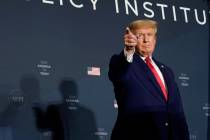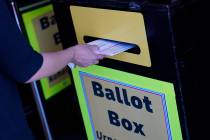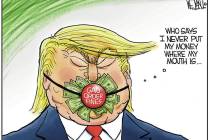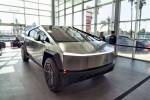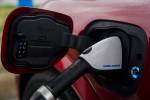EDITORIAL: Tesla gamble requires transparency, accountability
Against steep odds, Nevada has won the furious chase for the country’s most coveted economic development project. But that victory comes at a steep price — with steep risks.
State lawmakers will meet in special session this week to authorize the most generous tax abatement package in Nevada history for Tesla Motors. In exchange for breaks that could total $1.3 billion over 20 years, Tesla will build a massive lithium-ion battery plant in Sparks, east of Reno, that one day could employ 6,500 people. The company plans to open the plant in 2017 and manufacture hundreds of thousands of batteries per year for its plug-in electric cars and backup power uses.
The question of whether Nevada should give so much to an unproven business that’s already heavily dependent upon government subsidies, unfortunately, appears moot. Republican Gov. Brian Sandoval would not have brought Tesla CEO Elon Musk to Carson City for a Thursday news conference announcing the deal if he didn’t already have broad lawmaker support for the abatements. And in the days since the announcement, nary a legislator has come forward to denounce the deal, or the general idea of giving some businesses tax immunity while making others pay full freight.
Indisputably, Nevada needs jobs, especially nongaming jobs. The state’s jobless rate remains among the country’s highest. Through multipliers the $5 billion plant is expected to create thousands more supporting jobs and have a 20-year economic impact of $100 billion. And Tesla’s arrival could lead to even more manufacturing and high-tech jobs.
To beat Texas, California, Arizona and New Mexico for the Tesla plant, Nevada negotiators had to blow the doors off Mr. Musk’s Model S. And did they ever. Tesla gets a 20-year exemption from all sales and use taxes, a 10-year exemption from property and payroll taxes, and nearly $200 million in tax credits. The state will scale back existing tax credits, including its new film tax breaks, to cover part of the cost. The market for business recruitment has been reset, especially when considering Tesla’s tiny market for its expensive cars.
So who will pay to make up for the tax revenue needed to provide Northern Nevada’s resultant population growth with schools and other government services? That’s the first question Southern Nevada lawmakers should answer when they meet this week, because Clark County’s days of subsidizing the rest of the state should be — must be — at an end.
Regionalism should come into play this week, if only to make sure Southern Nevada isn’t stuck with the bill for highway construction and school enrollment growth in both parts of the state. Part of the Tesla deal requires the state to acquire the right of way needed to link Interstate 80 to U.S. Highway 50, which would alleviate some of the traffic problems that will result from the factory’s opening. Where is that $43 million coming from, considering the backlog of Clark County highway projects and the comparatively light traffic of the Reno area?
Lawmakers should focus this week’s work on transparency and accountability. For Tesla to get all its tax abatements, it must meet its promised benchmarks in spending and hiring. The company should be required to report those numbers to the state, at a minimum, on a semiannual basis. And if the company’s plans fizzle like so many other green enterprises, resulting in massive layoffs and unemployment claims, Tesla should be required to repay some of its abatements.
Protection for taxpayers shouldn’t be too much to ask.














